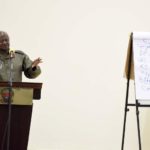It is not common practice for media practitioners to respond to each and every accusation that may be leveled against their news outlets by politicians or political party representatives. However, when it becomes apparent that the people in charge of issuing communications on behalf of political parties are becoming economic with the truth and in the process damaging the reputations of the respective media houses, it becomes imperative for one to set the record straight. This is because political parties are representative of the people; their existence being one of trusteeship. This therefore, means that the political parties draw their mandate from their members and supporters and are beholden to them at all times. This undertaking involves telling the truth, which in effect ‘sets you free’.
Recently, writing as the Head of Media and Communications Department in the Uganda Peoples Congress (UPC), Mr Andrew Omara ‘unleashed’ a missive against this publication, accusing its reporter and Editor of publishing a ‘lazy piece of journalism’, following the publication of a story titled ‘UPC asks Besigye to abandon defiance campaigns’. In the missive Mr Omara disappointingly avoids pointing out his points of contention, instead choosing to deal with minor issues like semantics. For instance, Mr Omara picks issue with the words ‘splinter faction’ and ‘in bed with’, a surprising undertaking for someone who is involved with the daunting task of communicating his organisation’s policies and ideas to the public on an almost daily basis.
‘In bemusement I “Googled” the definition of the word “splinter” and the first offering was ‘a small, thin, sharp piece of wood, glass, or similar material broken off from a larger piece,’ Mr Omara adds. How we wish he had referred to any dictionary, and checked for the words ‘splinter faction’ instead of checking for ‘splinter’! He surely would have found what we meant. The same would apply if he chose to check for the words ‘in bed with’. But surely, words like ‘splinter faction’ and ‘in bed with’ are secondary and cannot be some of the disturbing points of contention for someone intending to put across a determined defence of his party’s stance on matters public.
However, suffice it to say that ‘figurative expressions’, whether oral or written, are part of any communications industry, used to drive a point home in a simple-to-comprehend manner.
That notwithstanding, the UPC, as many Ugandans were constantly reminded, was/is a ‘party of ideas’ and if that distinction is to be maintained, the likes of Mr Omara should avoid skirting over priority matters, by instead choosing to dwell on ‘non-issues’.
‘The UPC Secretary General, Edward Segganyi, whose name you have difficulty spelling even though it is widely available and most significantly at the Electoral Commission, was described as belonging to a ‘splinter faction’’, Mr Omara started off. Now, Mr Omara, of course you heard of typographic errors, and a good example is the way different people wrote the name of the former Libyan leader Col Muammar Gaddafi. Others wrote it as Quaddafi, while yet others wrote it as Qaddafi! But no one lost the prize!
Anyhow, without prejudice, Mr Omara’s missive seeks to prove that Jimmy Akena, the Lira Municipality Member of Parliament (MP), is the leader of the UPC. So, in a bid to drive his point home, in the missive Mr Omara quotes a number issues, both legal and moral, to justify his point. Unfortunately, he hinges his ‘legal arguments’ on the UPC Constitution, a document which is subordinate to the Uganda Constitution of 1995 and the Political Parties and Organisations Act (PPOA).
Now, in December, 2015, High Court Civil Division Judge Yasin Nyanzi, while ruling on an application filed by then UPC Vice President Joseph Bbosa, declared Mr Akena’s ascendancy to the UPC presidency as illegal.
In the ensuing brouhaha, the rival parties were advised to dialogue, an advisory that was not heeded to, in effect meaning that the ruling by Justice Nyanzi, which has since not been overturned by any superior court, still stands!
Interestingly, in the missive there is no where Mr Omara refers to the court cases, making his submissions suspicious.






